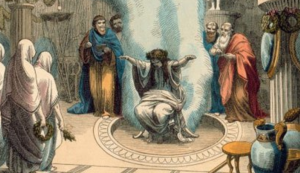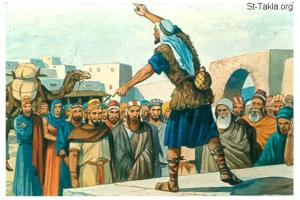Messengers of God
The Messengers of God guide and inspire us, offering wisdom, comfort, and hope. Let’s embrace their teachings and virtues to become messengers of God ourselves.
Who were the divine prophets in Israel? Theologians have the daunting task of interpreting the messages of the prophets within the place and time that they lived in. Nonetheless, most theologians agree that the God of the prophets of Israel was Yahweh. Yahweh’s name is mentioned many times throughout the Old Testament, and it is the name of the lawgiver whose name can be found in Exodus, Leviticus, and Deuteronomy. His name can also be found in proverbs, where scripture states that (the fear of Yahweh is the beginning of wisdom). Yahweh was the God that appeared to Moses at the burning bush. Accordingly, Yahweh was the God of the prophets.
“Intuitive” divining was an example of how the prophets would communicate with the God of Israel. This was the primary method of communing with the divine in Israel compared to the seers who used” inductive” divining in locations like Mesopotamia. Today, we can still find people who practice “inductive divining”. This type of practice is usually known by astrologists and people who read things, like objects i.e. tea leaves, palms, tarot cards, etc.

Research suggests that we can find persons in Deuteronomy that were considered genuine seers, even though they were not equivalent to the seers who were known as “inductive diviners”. College texts often reference the ancient character David who used an early form of intuitive divinizing. ( 1 Sam 23:6) However, after the ‘fall of Jerusalem” the method of contacting God through intuitive divining, like David, seemed to have vanished after Jerusalem fell. 
Theologians have suggested prophets were sought for divine guidance and assistance. One instance where a “prophet” was pursued can be found in (ESV) 1 Sam 9:6 -11 He said to him, “Behold now, there is a man of God in this city, and the man is held in honor; all that he says surely comes true. Now let us go there, perhaps he can tell us about our journey on which we have set out.” Then Saul said to his servant, “But behold, if we go, what shall we bring the man? For the bread is gone from our sack and there is no present to bring to the man of God. What do we have? The servant answered Saul again and said, “Behold, I have in my hand a fourth of a shekel of silver; I will give it to the man of God, and he will tell us our way. (Formerly in Israel, when a man went to inquire of God, he used to say, “Come, and let us go to the seer”; for he who is called a prophet now was formerly called a seer.)
Then Saul said to his servant, “Well said; come, let us go.” So, they went to the city where the man of God was. As they went up the slope to the city, they found young women going out to draw water and said to them, “Is the seer here?
The aforementioned prophecy is an example of a prophet of an intuitive type. In addition, Jeremiah 18:18, is an example of a verse that speaks about wise men that are teachers who are also considered prophets. Then said they, Come and let us devise devices against Jeremiah; for the law shall not perish from the priest, nor counsel from the wise, nor the word from the prophet. Come, and let us smite him with the tongue, and let us not give heed to any of his words. According to this verse, a prophet was assumed to receive and give messages from God. Also, it explains that in ancient times, the priest taught the law, the sage counseled persons, and the prophet brought the word of God to the people. Additionally in Num 22: 5-6, where a prophet was also called a “seer” as the prophet experienced profound knowledge. Then they sent messengers to Balaam the son of Beor at Pethor, which is near the river in the land of the sons of his people, to call him, saying:
“Look, a people have come from Egypt. See, they cover the face of the earth, and are settling next to me! Therefore, please come at once, curse these people for me, for they are too mighty for me. Perhaps I shall be able to defeat them and drive them out of the land, for I know that he whom you bless is blessed, and he whom you curse is cursed.”

This communication may suggest that the people who sought seers believed that the prophet’s knowledge was received from the divine and the future of Israel. It appears that the prophets prophesied in the way the messengers lived in the Near East that is, delivering God’s messages themselves. Amos 1:3-2:16 is an example of a message that was delivered in the first- -person. Prophets could be accessed in large centers of worship. Some prophet-seers could be accessed in private places because sages were highly regarded in ancient Israel and were very much part of everyday culture. Consequently, self-governing seer-prophets also anointed Kings often contested the worship of deceitful gods.
Meeting the prophets is also some of the activities of the prophets. He states that prophets were messengers of God, and he claims that their job was specifically to pass on God’s messages to the people. Messengers often wrote down their communications with God, as many of the messages were for specific people, like Kings. The prophets also recorded other important information for the future generations of Israel and instructions about how to properly conduct oneself around others. (28)
Writing was a key task of the prophet. Many of the prophets had their prophecies written down after the prophet’s death, by scribes and associates. Such prophecies were put together in manuscript form, like those that we see in the Old Testament, as it was also meant to help others in treacherous times.
In my opinion, when one reads the Old Testament, particularly the stories of the Minor Prophets, one can’t help but wonder, why does God let so many injustices happen. Perhaps God leaves it up to us. He gave each and every one of us a gift. Yet, if one looks around, we can see that some of us cannot even speak, so, I presume that speaking is also a God given gift. And, for those who cannot speak, perhaps, those people may be gifted with other blessings.
Amos used his voice and spoke up for the injustices in the ancient world. The characters in the Old Testament were ordinary men and women like us but because Amos had extraordinary faith in God, he became an extraordinary prophet.

Many prophets, like Amos, came from humble beginnings and lived through very turbulent times. However, regardless of Amos’s origins and bad experiences, he believed he was called by God, stood up, demanded justice, and spoke up for the poor who were being oppressed and exploited by the wealthy, privileged people. Amos 2:7 “They trample helpless people in the dust and shove the oppressed out of the way. Both father and son sleep with the same woman, corrupting my holy name”.
It is clear that The God of Israel, the Just one, as described in the Old Testament, was thoroughly displeased with the behavior and actions of the people who were part of the elite and ruling class.
Amos 2:3 I will destroy her ruler and kill all her officials with him,” says the LORD.













